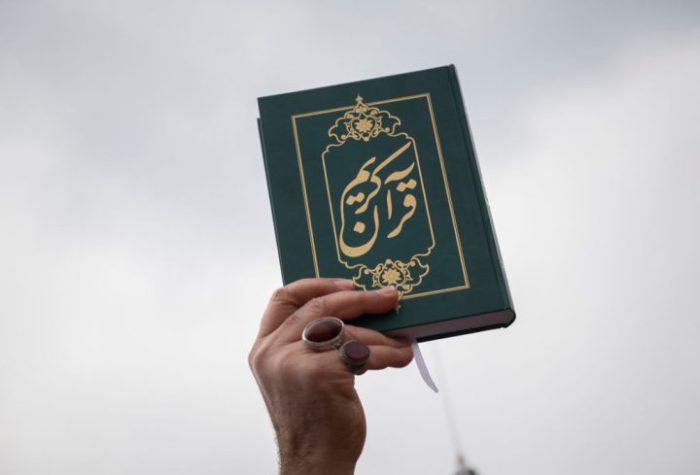Imagine living in a country so religiously uptight that even making a smudge on a copy of the Quran could turn into a police matter. A country so nervous of offending Islam that even kids could be punished for allegedly disrespecting that religion. A country so determined to ringfence certain religious beliefs from scrutiny or mockery that you might hear actual politicians denouncing as ‘provocative’ and ‘terrible’ any slight against those beliefs.
Well, if you’re in the UK then you live in that country. Forget Iran. Never mind Afghanistan. It’s right here in Blighty, a supposedly free, mostly secular nation, that all of the above recently happened. Let’s call it ‘Qurangate’. And let’s talk about just how messed up it is.
Is it against the law now to cause ‘minor damage’ to a holy book with ‘no malicious intent’?
It happened in Wakefield in West Yorkshire last week. Four pupils were suspended from Kettlethorpe High School for allegedly ‘desecrating’ a copy of the Quran (that D-word was literally used by a local Labour councillor). The headteacher issued a statement chastising the students for failing to ‘treat the Quran with the respect [it deserves]’. The school met with local Muslim leaders to reassure them that the holy book in question ‘remains fully intact’. Then the police got involved. A spokesperson for West Yorkshire Police said the force was ‘liasing’ with the school. We are ‘continuing to work closely with the school’ over this concerning incident, the cops said.
Wow. So what exactly happened at Kettlethorpe High? Did an ‘Islamophobic’ mob of kids build a pyre of Qurans? Did out-of-control pupils maliciously damage someone’s property, someone’s revered book? No. Not even close. In the words of the BBC’s report, ‘some pages were smudged with dirt’. A photo shows a faint mark on the corner of one of the pages. Contrary to local rumours, the Quran was not kicked around. The police said their ‘initial inquiries’ suggest ‘minor damage was caused to the text’.
This is an extraordinary story, on so many levels. Schoolkids suspended for causing ‘minor damage’ to a book? Isn’t that what schoolkids do? When I think of the obscenities that were scrawled in my school textbooks and even in our copies of the Bible. We weren’t suspended – and this was a Catholic school! Certainly police officers never darkened the door of our classrooms to make inquiries about our ‘desecration’ of a holy book.
Suspending schoolchildren for smudging a copy of the Quran strikes me as a wild overreaction. As for the idea that these kids ‘desecrated’ the Quran, that seems to be simply untrue. That accusation was made by Labour councillor Usman Ali. A copy of Islam’s holy book was ‘desecrated’, he said. This was a ‘serious provocative action’ that ‘needs to be dealt with urgently by all the authorities, namely, the police, the school and the local authority’, he continued.
‘Desecration’ means a conscious act of violent disrespect, the intentional physical defilement of a sacred monument or place. There is no evidence whatsoever that anything like that happened at Kettlethorpe High. Indeed, the headteacher said there was ‘no malicious intent’ among those involved (which raises the question of why they were suspended). To my mind, a local councillor branding children as blasphemous desecrators is far more disturbing than a few kids mucking about with the Quran.
Then there’s the police involvement. This aspect is genuinely chilling. What business is it of the police if children – or anyone else, for that matter – mildly mistreat a copy of the Quran? Is it against the law now to cause ‘minor damage’ to a holy book with ‘no malicious intent’? If it is, then we should urgently change the law. If it isn’t, then the involvement of police in a small, silly instance of Quran-smudging is an act of tyrannical overreach.
Britain has no blasphemy laws. We ditched them in 2008, which was a great victory for freedom of thought and freedom of speech. Yet blasphemy policing seems to be coming back, sneakily, under the guise of tackling ‘Islamophobia’. It’s a brave soul who would criticise or make fun of Islam in 21st-century Britain. You could find yourself suspended from school, like those kids at Kettlethorpe, suspended from your job, like gymnast Louis Smith, or blacklisted from university campuses, like the Iranian dissident and feminist, Maryam Namazie.
This strange and strict control of discussion of Islam can have dire consequences. Who can forget the case of the schoolteacher at Batley Grammar, also in West Yorkshire, who was hounded into hiding for the ‘crime’ of showing his pupils an image of Muhammad? Or the craven decision by UK cinema chains to pull the movie The Lady of Heaven last year after Islamist protesters kicked up a storm? In such a febrile and censorious climate it strikes me as incredibly reckless to treat four children as wicked defilers of Islam’s holy book.
We need to remind ourselves that freedom of speech includes the freedom to criticise Islam. Treating ‘disrespect’ of Islam as a borderline crime is not only a grave assault on freedom of speech – it also demeans our Muslim citizens by singling them out as a community that requires special protection from free, open discussion. We criminalise free expression and infantilise Muslims when we censor criticism of Islam. Qurangate should be a wake-up call to how illiberal and dangerous the crusade against ‘Islamophobia’ is becoming.





